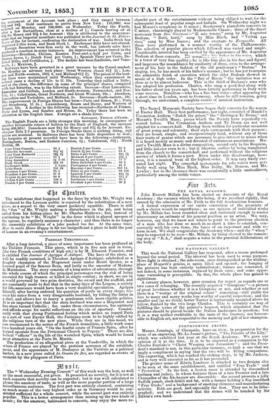PARISIAN THEATRICALS.
After a long interval, a piece of some importance has been produced at the Theatre Francais. This piece, which is in five acts and in verse, the two French conditions of high art,) is by M. Edouard Foussier, and is entitled Une Jourrtie d' Agrippa d' Aubigne. The hero of the piece, as will be readily surmised, is Theodore Agrippa d'Aubigne, celebrated as a doughty champion of the Huguenot cause under Henri Quatre, as a learned pupil of the famous Beza, and lastly as the ancestor of Madame de Maintenon. The story consists of a long series of adventures, through the whole course of which the principal personages run the risk of being executed for high treason or killed in single combat ; in short, we are in a world governed by two grim destinies, the sword and the scaffold, and are constantly made to feel that in the noisy days of the League, a society for life-assurance would have been a very doubtful speculation. Agrippa himself, after having endured his quantum of perils in every shape, res- cues his sister from a very disagreeable husband, by killing the latter in a duel, and allows her to marry a gentleman with more eligible politics. It is an important fact that the slain husband was once a Huguenot and has since turned Catholic ; for, under these circumstances, his untimely end affords scope for useful reflections on the sin of apostacy. Consist- ently with that strong Puritanical feeling which makes us regard Paris as a sort of vast Exeter Hall, the Parisians seem to be highly edified by the religious turn of the new piece. While they are in this mood, wo can recommend to the notice of the French dramatists, a little work some two hundred years old, " On the fearful estate of Francis Spire, after he turned apostate from the Protestant Church to Popery." There are dia- bolical "effects" in th life of the wretched Spira, which would be found most attractive at the Porte St. Martin.
The production of an allegorical piece at the Vaudeville, in which the wines of France are played by the prettiest actresses of the establish- ment, and the appearance of M. Deshayes at the Variets as a political barber, in a new piece called Le Cousin du Boi, are regarded as events of moment by the playgoers of Paris.


































 Previous page
Previous page